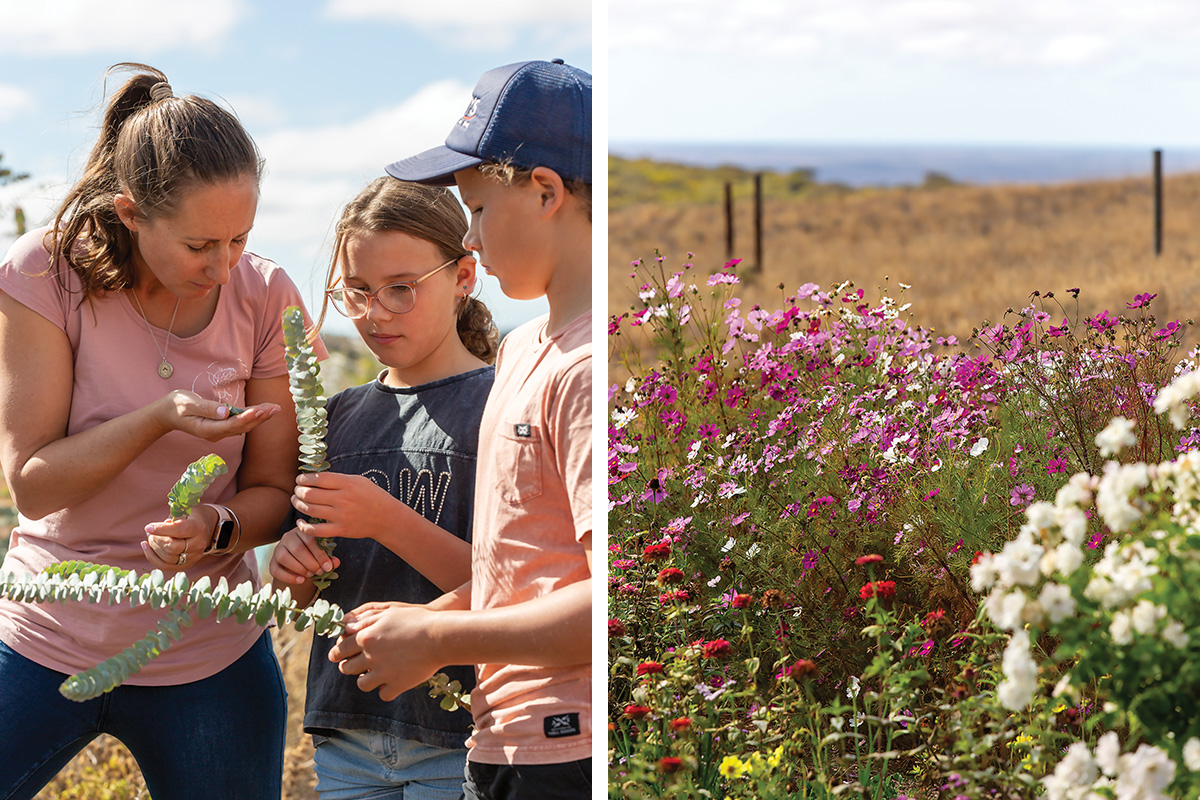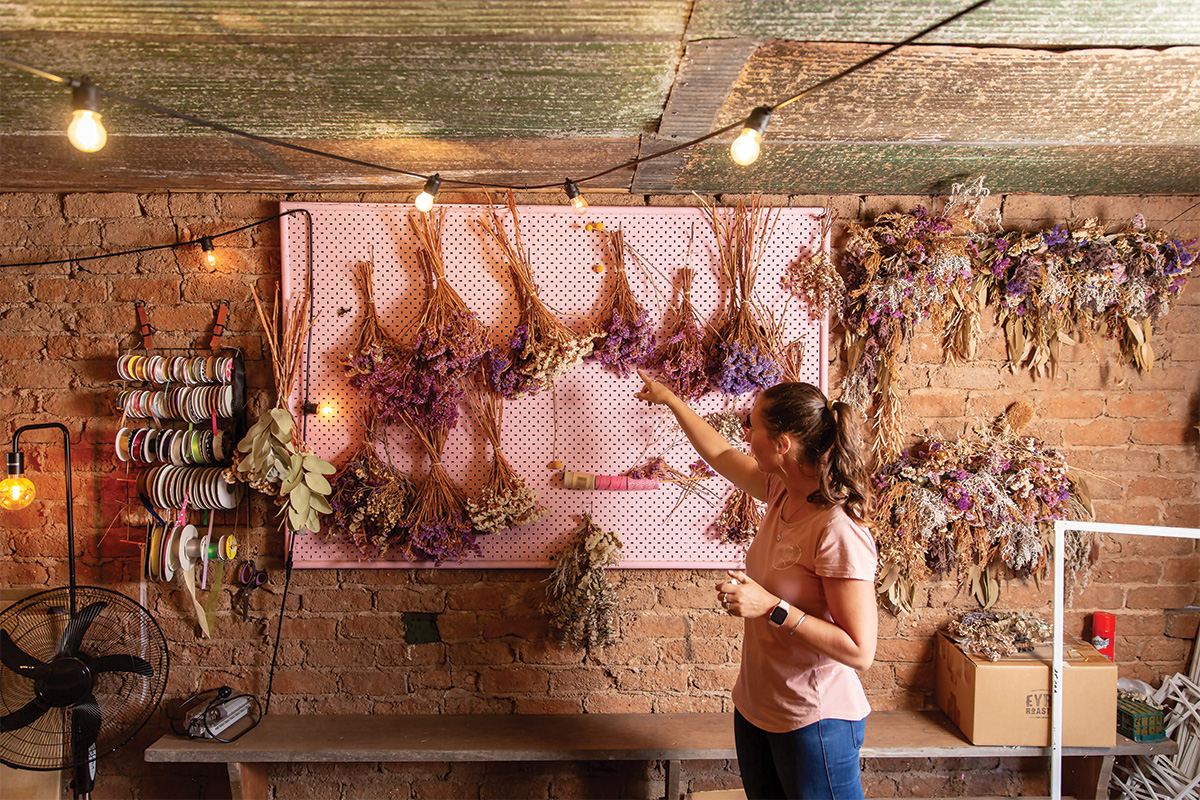The farm with flowers

South Australian farmers are no strangers to the plight of drought, but Jasmin Piggot on the Eyre Peninsula is turning a bad situation into something brighter.
Located on the eastern side of Eyre Peninsula, Cowell is a town little more than 100 kilometres from Whyalla – about halfway between Port Augusta and Port Lincoln. If you venture just a little further out, you’ll find Miltalie, complete with its population of about 150.
One of those 150 people who call Miltalie home is Jasmin Piggot, whose foresight to turn a bad situation into a better one was the impetus for an unexpected flower farm in the locality.
A flag bearing the words Poodra Springs Native Flowers welcomes all who come to see this slice of botanical bliss Jasmin has created. Jasmin greets SALIFE to her farm, flanked by her children, 13-year-old Chase and 11-year-old Bella as she sets down coffees under the expansive pergola attached to her home.
It’s a place where she hosts events and helps plan events further afield – and it’s all a result of the nearly two acres of flower rows that can be spotted up on a nearby hill.
When Jasmin moved into the property, which is her husband Wayne’s 4000-hectare family farm, there was no garden to speak of, but when Chase came along, the couple decided it was time to add some greenery outside.
“We needed some grass and a swing set and have slowly been adding and adding,” says Jasmin.
Now, the front garden boasts an explosion of colour thanks to the zinnias, cosmos, dahlias, billy buttons, ranunculus and snap dragons. But that was only the very beginning of Jasmin’s foray into planting on the property. In 2018, Jasmin was a dance teacher, driving the equivalent of Adelaide and back to teach each week. She’d hold classes in Cowell, Cleve, Port Neale, Tumby Bay, Cummins and Lock. But she’d always wanted to be a farmer and, of all things, a drought prompted a new venture on the land.
“I always enjoyed gardening and having a green space and I suppose when the 2018 drought started, I enjoyed being out in the garden and Wayne would always make sure I had a tank of water to keep the garden green.”
As the crops failed, Jasmin would look out to a hill that was in view of the house and wonder about the scrub that was still able to grow in these thirsty conditions. An idea that native flowers might be just as hardy began to turn around in her head.
“I was sure that if they grew, we could sell them,” she explains. “I thought about it for a while and Wayne is very business-minded, so we started talking about the steps we needed to work towards it.”

The research and planning began and the first thing on the list was, of course, water. There were a few years from that curious thought to the first planting but in 2021, the trees went in – although there was also a little cutting garden in the meantime, just to experiment with.
A working bee with all the neighbours and some early starts from Chase – he was out building tree covers with a cousin at 5am one day – over the June long weekend was what it took to go from concept to fruition.
Since then, it’s mostly been a game of patience, with natives taking up to five years to flower or grow an adequate amount of foliage. Although, there’s been enough growth to get a good start on picking. On the hill, Jasmin is growing different types of eucalyptus, wattle, Geraldton wax, banksia and tea tree, as well as proteas and leucadendrons (both native to South Africa).
“Some things have been growing really well, some not so much,” she says.
Jasmin’s long-term plan included hosting visitors for farm tours and bouquet-making, and it arrived earlier than anticipated when the demand became apparent.
“Around the one-year mark, so many people were asking to come out and have a look. I bit the bullet and said yes – we have this nice big pergola area to host them.
“People really wanted to see it at the start and then wanted to come back maybe in a few years’ time and see how much it’s grown. I think they were really keen to be part of it because it’s something new and different in our area.”
Among the events Jasmin has hosted are an International Women’s Day luncheon to celebrate the women of the district, and a wedding.
“I love creating bunches for brides, but also just every day – to cheer someone up or for a birthday,” she says.
“Seeing someone’s face when you give them a bunch of flowers is just amazing.”
Subscribe for updates

Eventually, Jasmin will wholesale her flowers to local florists and she’s been dropping off a few bunches here and there in shops around Cowell. To her surprise, she’s been loving arranging them herself.
“I love the process and creativity of it,” she says. “It’s not a formal bunch, it’s very much a garden mix and I worried people might not enjoy that, but people are quite happy to have seasonally-grown flowers. My bunches will change from week to week depending on what’s in season and what’s growing well. A winter bunch will look completely different to a summer bunch and it’s really nice to know people are happy with that and want that.”
Jasmin says the feedback is that people like to know where their purchases come from, and that what they’re buying is local and seasonal.
“I think people are a lot more conscious of where things are grown and how they’re grown.”
Jasmin hasn’t been playing it safe when it comes to water – the plants only get a drink when they absolutely need it.
“They could probably be a lot bigger and more established if I watered them a lot more, but we need them to survive the next dry spell. Droughts are part of our history and they will always come and go, so the whole reason behind this was to be sustainable through the next drought.
“If I don’t water them flat out, they’ll get their roots down deep and grow up tougher and stronger.
It’s all about trying something new and different and to diversify for when there’s no rain and no crops.”
Most of Jasmin’s time is spent out in the flower rows, pulling weeds; they’ve tried to remain as chemical-free as possible and even avoid spraying in the crops that surround the rows so people can feel safe to “bury their noses in the bunches to smell them”.
Any spare time is taken up by Jasmin’s multiple community pursuits, from presiding over the Cowell Football Club – the first female club president in the Eastern Eyre League – to chairing the local school’s governing council.
Then, there’s the quarry they’re mining rock rubble from, to be made into road base for local roads. The kids, however, have free run of all of the hilly land that’s not arable, and Bella dries the flower petals to make bath salts.
“They ride their motorbikes, bushwalk and go find tadpoles. And they help weed,” Jasmin laughs.
This story first appeared in the June 2025 edition of SALIFE Magazine.




